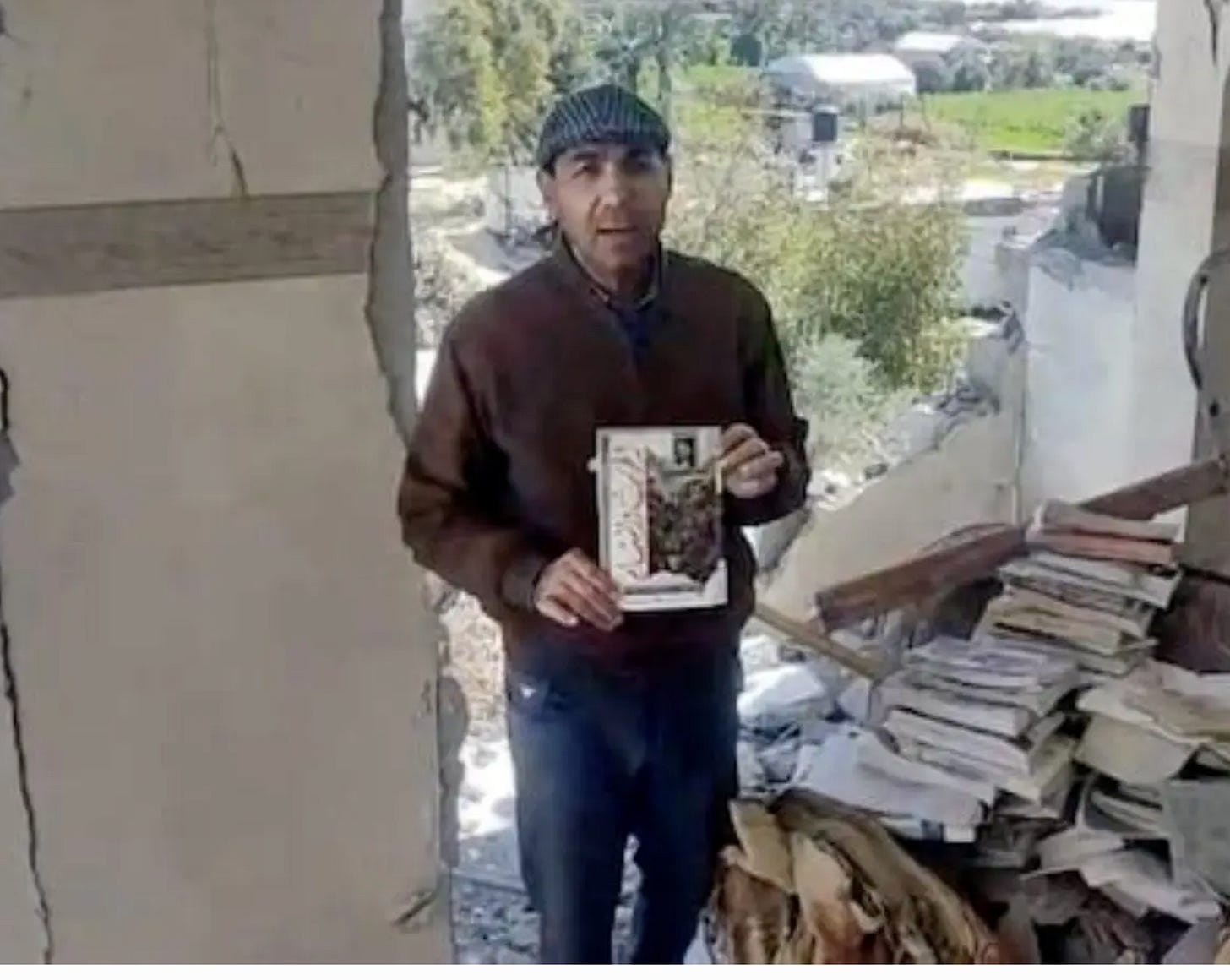Exclusive, First Hand Report: "An Encounter With The Poet Nasser Rabah, Between Gaza And Brooklyn," By Ammiel Alcalay
"Alot of bombing, a lot of death, and unimaginable terror...Can I surprise you?" "Try me."
I happened to be on the phone with Ammiel Alcalay this evening, as news of Hamas’ statement broke, and when he informed me of it, I asked about his dear friend, the Gaza based poet Nasser Rabah. When Ammiel said he’d been in contact with him, I asked if he would mind writing something for us. I was delighted that he agreed. A couple of hours later, he sent this:
An Encounter with the Poet Nasser Rabah, between Gaza and Brooklyn
When I heard there was heavy bombing in the area where Nasser and his family live, as always, I messaged to make sure everyone was alright. Thankfully I got a quick response, with Nasser saying it had been an awful night: “a lot of bombing, a lot of death, and unimaginable terror… Israel is in a state of madness.” After a few more messages, he asked: “Can I surprise you?” “Try me,” I responded. “Hamas agreed.” I wrote back that I’d seen it posted, probably a minute or two before, and was about to ask him what he thought. We came to similar conclusions: the agreement was very carefully worded, going right into negotiating mode. And that a lot would depend on what kinds of pressure was and will be brought to bear behind the scenes.
I then read an article Nasser had just finished which began with the story of the killing of a young relative who had gone back to their house with her brother to get something after long displacement. She remained in phone contact for two days from under the rubble but the occupation forces wouldn’t let a rescue team come in and, on the second day, the building was bombed again, killing both her and her brother. I’d followed the story closely because another friend from Gaza, displaced in Cairo, was a friend of Nasser’s relative and reported on the events.
In conversation with his relative’s uncle, the uncle stressed to Nasser that soldiers go crazy when they see the courage of people in Gaza, when they defy displacement orders for, as Nasser writes in the article, “they want an occupied and submissive people, but instead they find a stubborn and resilient people, against whom they unleash all kinds of hatred.”
Nasser goes on to write: “after all the suffering and humiliation that the people here have endured, it can simply be said that this is a planned and deliberate war—not a reaction—to empty Gaza of its population and buildings and create a difficult and bloody military situation that makes their displacement to Sinai seem like a logical outcome that occurs during every war anywhere in the world...The goal that seems completely clear and unquestionable to us in Gaza is that Israel deliberately targeted civilians, deliberately killed as many of them as possible, deliberately humiliated them and broke their will, and deliberately inflicted the most severe pain to make Gaza uninhabitable, leaving the survivors with the choice between voluntary emigration or remaining in a large cage in inhumane conditions, as their presence represents an existential threat to the idea of a greater, expansionist Israel, especially since 80% of them are refugees whose grandparents left the occupied territories in 1948.”
Finally, in conclusion, Nasser writes: “What can be said now, after these two years? All this is happening while journalists are prevented from entering Gaza on the pretext of protecting them from danger, while thousands of residents are being killed without finding a grave to bury them in, and perhaps without even finding an ambulance to transport the dead before they are devoured by stray dogs and cats...
“On March 19, 2024, Francesca Albanese, the UN Special Rapporteur on Humanitarian Affairs in Palestine, said that Israel “does not want witnesses to the genocide,” and I say that Israel has not been able to hide our words and the images on our small phones, which carry the blood of children, the remains of women, and the grief of adults, from reaching every corner of the world.”
Nasser Rabah, from Gaza, October 3, 2025
On Translating Nasser Rabah: Important In Ways We Have Yet To Comprehend.
Note: This below was also from Ammiel, sent to me 2 days ago:
Hello Friends,
I know all of you have contributed in the past and are doing everything you can in many different ways.
But people are dying/getting killed from the blockade imposed on the entry of food into Gaza. More and more people are desperate enough to risk going to the kill zones of US/Israeli food distribution sites where over 1,00 people have been killed and over 6,000 wounded. People are fainting in the street. Without intervention, thousands more will succumb.
This campaign is not just for an individual family but also serves as communal infusion to provide a lifeline to neighborhoods and communities fighting for survival. Keep in mind that rates for actually withdrawing money can go up to 50% of the value of the transfer.
This campaign is for poet, novelist, and Agricultural Engineer Nasser Rabah—recently Nasser has been providing talks on FB, sharing his expertise in how to grow food under these catastrophic circumstances. While Nasser’s poems have traveled far and wide, he, his family, and their community remain under siege. Please consider giving any amount you can for this campaign.




It sounds like literal hell on Earth, prayers for Mr. Rabah.
May those who are still asleep, awaken, and realize our governments do not represent us. We the people are all one, and must defend our humanity within, in our own hearts, and throughout the world.